(完整word版)英语延续性动词
英语短暂性动词和延续性动词
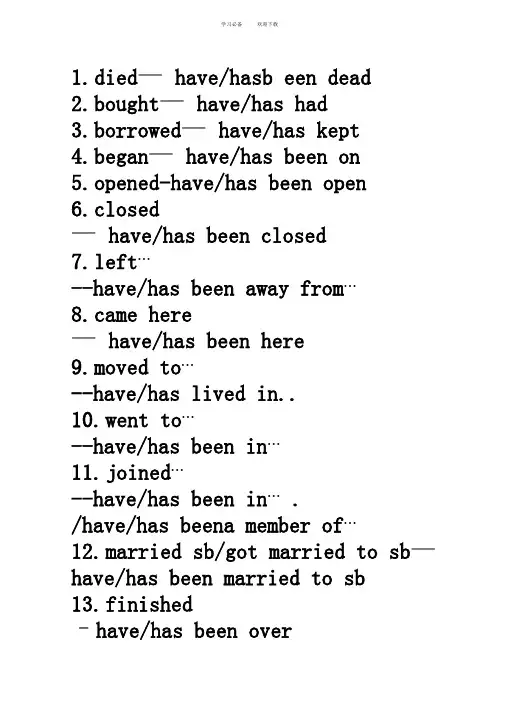
1.d ied—have/hasb een dead2.b ought—have/has had3.b orrowed—have/has kept4.b egan—have/has been on5.o pened-have/has been open6.c losed—have/has been closed7.l eft⋯--have/has been away from⋯8.c ame here—have/has been here9.m oved to⋯--have/has lived in..10.w ent to⋯--have/has been in⋯11.j oined⋯--have/has been in⋯./have/has beena member of⋯12.m arried sb/got married to sb—have/has been married to sb13.f inished–have/has been over14.m ade/became friends—have/has been friends15.b egan to teach—have/has taught16.l ose (lost—) haven'/h t asn't had17.b ecome (became—) have/has been * He went to London in 1990. He is still in London now.He has been in Londons ince 1990. * I borrowed the book two weeks ago.I have kept the book for two weeks/sincet wo weeks ago. It is two weekss ince I borrowed the book.He joined the League two yearsago. = It is two years since hejoined the League.= He has been in the League for two years/ since two years ago.同义句(用两种方法变):1.The film began ten minutes ago. It is ⋯since⋯.It is ten minutes since the film began. The film has been onf or ten minutes/since ten minutes ago.2.It is three days sinceh e left. He left three days ago.He has been away from heref or three days/since three days ago. 3.He came here half an hour ago,and he is still heren ow.It is half an hour since he came here. He has been here for half an hour./since half an hour ago.4.Mary married Tom ten years ago. It is ten years since Mary married Tom.Mary has been married to Tom forten years/since ten years ago.5.I began to teach English fourteenyears ago.It is fourteen years since I began to teach English.I have taught English for fourteen years/since fourteen years ago.I have been an English teacher for14 years.Test in class1.He moved to Shenzhen two yearsago.It is two yearssince he moved to Shenzhen.He has lived in Shenzhen for two years/since two years ago.2.My father went to Shanghai lastweek.It is a week since my father went to Shanghai.My father has been in Shanghaisince last week.3.Mike joined the army threeyears ago.It is three years since Mike joined the army.Mike has been in the army for three years/since three years ago.4.It is ten minutes since thefilm began.The film began ten minutes ago. The film has been on for ten minutes/since ten minutes ago.5.He bought the computer fourweeks ago.It is four weekss ince he bought the computer.He has had the computer for four weeks/since four weeks ago.。
(完整word版)since的用法
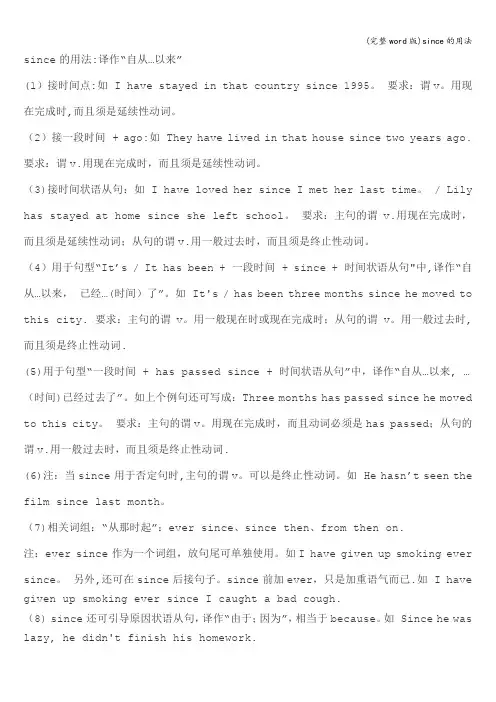
(完整word版)since的用法since的用法:译作“自从…以来”(1)接时间点:如 I have stayed in that country since 1995。
要求:谓v。
用现在完成时,而且须是延续性动词。
(2)接一段时间 + ago:如 They have lived in that house since two years ago. 要求:谓v.用现在完成时,而且须是延续性动词。
(3)接时间状语从句:如 I have loved her since I met her last time。
/ Lily has stayed at home since she left school。
要求:主句的谓v.用现在完成时,而且须是延续性动词;从句的谓v.用一般过去时,而且须是终止性动词。
(4)用于句型“It’s / It has been + 一段时间 + since + 时间状语从句"中,译作“自从…以来,已经…(时间)了”。
如 It's / has been three months since he moved to this city. 要求:主句的谓v。
用一般现在时或现在完成时;从句的谓v。
用一般过去时,而且须是终止性动词.(5)用于句型“一段时间 + has passed since + 时间状语从句”中,译作“自从…以来, …(时间)已经过去了”。
如上个例句还可写成:Three months has passed since he moved to this city。
要求:主句的谓v。
用现在完成时,而且动词必须是has passed;从句的谓v.用一般过去时,而且须是终止性动词.(6)注:当since用于否定句时,主句的谓v。
可以是终止性动词。
如He hasn’t seen the film since last month。
(7)相关词组:“从那时起”:ever since、since then、from then on.注:ever since作为一个词组,放句尾可单独使用。
(完整版)since后接延续性与短暂性动词的用法
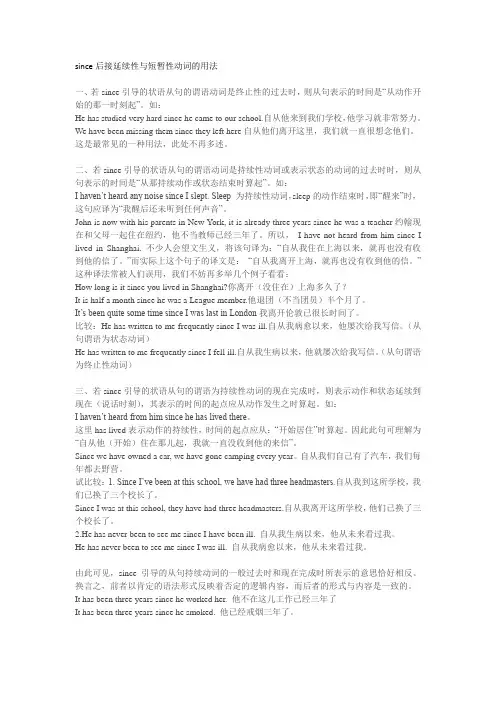
since后接延续性与短暂性动词的用法一、若since引导的状语从句的谓语动词是终止性的过去时,则从句表示的时间是“从动作开始的那一时刻起”。
如:He has studied very hard since he came to our school.自从他来到我们学校,他学习就非常努力。
We have been missing them since they left here自从他们离开这里,我们就一直很想念他们。
这是最常见的一种用法,此处不再多述。
二、若since引导的状语从句的谓语动词是持续性动词或表示状态的动词的过去时时,则从句表示的时间是“从那持续动作或状态结束时算起”。
如:I haven’t heard any noise since I slept. Sleep 为持续性动词,sleep的动作结束时,即“醒来”时,这句应译为“我醒后还未听到任何声音”。
John is now with his parents in New York, it is already three years since he was a teacher约翰现在和父母一起住在纽约,他不当教师已经三年了。
所以,I have not heard from him since I lived in Shanghai. 不少人会望文生义,将该句译为:“自从我住在上海以来,就再也没有收到他的信了。
”而实际上这个句子的译文是:“自从我离开上海,就再也没有收到他的信。
”这种译法常被人们误用,我们不妨再多举几个例子看看:How long is it since you lived in Shanghai?你离开(没住在)上海多久了?It is half a month since he was a League member.他退团(不当团员)半个月了。
It’s been quite some time since I was last in London我离开伦敦已很长时间了。
现在完成时延续性动词与非延续(瞬间性)动词

• It began to rain at eight yesterday morning .(正)又如:
• -When did you get to know Jack?
• -Two years ago.
•Then you've known each other for more th an two years.
• 一、延续性动词可以与表示时间段的状语连用。 表示时间段的短语有:
• for+一段时间,如:for 2 years,for a long time; since从句, 如:since he came here;
• since+时间点名词, 如:since last year, since 5 days ago; how long等。
• 2.延续性动词不能与表示短暂时间的"点时 间"状语连用。如: It raind at eight yesterday morning.(误 ) rain为延续性动词,而at eight表示"点时间 ",前后显然矛盾。如果用延续性动词表示 一瞬间的动作,可以借助come, begin, get 等终止性动词来表示。上句可改为
• 如:for 3 years,since he came here,how long,ect.且看下面三个错误句子:
• 1)Jim has come here for five years.
• 2)He has died for 3 years.
• 否定的终止性动词可以与表示时间段的时间状 语连用。
eg. I bought the book 5 days ago. I have had the book for 5 days.
(完整版)延续性动词与非延续性动词总结(含练习)
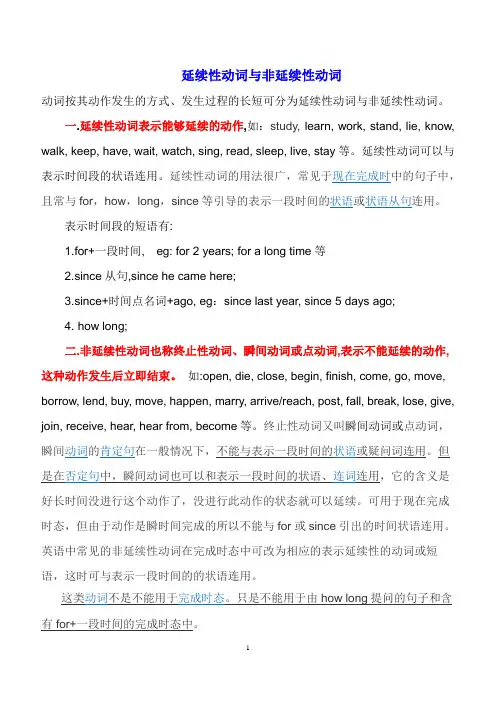
延续性动词与非延续性动词动词按其动作发生的方式、发生过程的长短可分为延续性动词与非延续性动词。
一.延续性动词表示能够延续的动作,如:study, learn, work, stand, lie, know, walk, keep, have, wait, watch, sing, read, sleep, live, stay等。
延续性动词可以与表示时间段的短语有:1.for+一段时间, eg: for 2 years; for a long time等2.since从句,since he came here;3.since+时间点名词+ago, eg:since last year, since 5 days ago;4. how long;二.非延续性动词也称终止性动词、瞬间动词或点动词,表示不能延续的动作,这种动作发生后立即结束。
如:open, die, close, begin, finish, come, go, move, borrow, lend, buy, move, happen, marry, arrive/reach, post, fall, break, lose, give,常见的这类动词有:go, come, leave, arrive, lose, land, catch, join, kill, find 等。
例如:1. He has joined the club for a long time. ( 错)2. He has been a member of the club for a long time. ( 对)3. His grandfather has died for over 30 years. ( 错)4. His grandfather has been dead for over 30 years. ( 对)【注意】之所以将这些动词称为瞬间动词,是因为这些动词在眨眼之间发生并终结。
短暂性动词和延续性动词
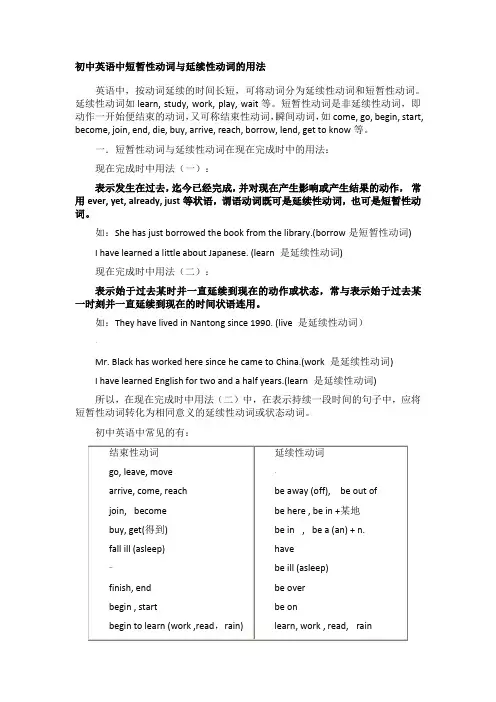
初中英语中短暂性动词与延续性动词的用法英语中,按动词延续的时间长短,可将动词分为延续性动词和短暂性动词。
延续性动词如learn, study, work, play, wait等。
短暂性动词是非延续性动词,即动作一开始便结束的动词,又可称结束性动词,瞬间动词,如come, go, begin, start, become, join, end, die, buy, arrive, reach, borrow, lend, get to know等。
一.短暂性动词与延续性动词在现在完成时中的用法:现在完成时中用法(一):表示发生在过去,迄今已经完成,并对现在产生影响或产生结果的动作,常用ever, yet, already, just等状语,谓语动词既可是延续性动词,也可是短暂性动词。
如:She has just borrowed the book from the library.(borrow是短暂性动词)I have learned a little about Japanese. (learn 是延续性动词)现在完成时中用法(二):表示始于过去某时并一直延续到现在的动作或状态,常与表示始于过去某一时刻并一直延续到现在的时间状语连用。
如:They have lived in Nantong since 1990. (live 是延续性动词)、Mr. Black has worked here since he came to China.(work 是延续性动词)I have learned English for two and a half years.(learn 是延续性动词)所以,在现在完成时中用法(二)中,在表示持续一段时间的句子中,应将短暂性动词转化为相同意义的延续性动词或状态动词。
初中英语中常见的有:1. His grandfather has died for ten years.(F)His grandfather has been dead for ten years.(T)2. My brother has joined the army for five years.(F)My brother has been in the army for five years.(T)My brother has been an armyman for ten years.(F)|3. He has gone away for a week.(F) He has been away for a week.(T)4. The film has begun for fifteen minutes.(F)The film has been on for fifteen minutes.(T)但是,短暂性动词的现在完成时的否定形式可以表示一种延续的状态,因此可以和表示一段的状语连用。
(完整版)非延续性动词转换成延续性动词
(完整版)非延续性动词转换成延续性动词非延续性动词与延续性动词的转换1. 转换为相应的延续性动词,用于现在完成时。
borrow — keep buy — haveput on — wear catch a cold — have a cold get to know —know get to sleep — sleep2. 转化为“be + 形容词/副词/介词/名词”begin / start — be on go out — be outclose — be closed open — be openget to/arrive/reach — be (in) die — be deadleave — be away finish — be overfall sleep — be asleep join — be in/be a member of become — be make friends — be friends come/go/ — be + 相应的介词短语非延续性动词与延续性动词的转换1. 转换为相应的延续性动词,用于现在完成时。
borrow — keep buy — haveput on — wear catch a cold — have a cold get to know —know get to sleep — sleep2. 转化为“be + 形容词/副词/介词/名词”begin / start — be on go out — be outclose — be closed open — be openget to/arrive/reach — be (in) die — be deadleave — be away finish — be overfall sleep — be asleep join — be in/be a member of become — be make friends — be friends come/go/ — be + 相应的介词短语非延续性动词与延续性动词的转换1. 转换为相应的延续性动词,用于现在完成时。
延续性动词与非延续性动词在现在完成时中的运用
表示动作对现在的影响或结果
总结词
非延续性动词的现在完成时可以用来描述某个动作对现在的影响或结果。
详细描述
通过使用非延续性动词的现在完成时,可以强调某个动作所导致的当前状态或结果。例如,“She has left her keys at home”(她把钥匙忘在家里了)。
表示动作发生的频率或习惯性行为
museum once."中,"visited"是一个非延续性动词,强调参观博物馆这个动作只发生 了一次。
05
常见错误及注意事项
混淆延续性动词与非延续性动词的用法要点一总结词要点二
详细描述
在现在完成时中,动词的时态需要根据动作发生的时间和 持续时间进行判断,延续性动词和非延续性动词的使用有 不同的规则。
特点
动作或状态在一段时间内不断进行或持续,强调动作的持续性。
例句
I have lived in this city for 10 years. (我住在这个城市已经10年 了。)
非延续性动词
定义
非延续性动词表示的是一个动作的瞬间完成 ,不能持续,如“arrive”、“die”、 “finish”等。
使用延续性动词的现在完成时可以表示某个动作或状态从过去 某个时间点开始一直持续到现在,强调动作或状态的持续性。
详细描述
例如,“He has been working as a doctor for the past ten years.” (他过去十年一直在当医生。)这 句话表示“当医生”这个动作从十 年前开始一直持续到现在。
忽略时间状语对动词时态的影响
总结词
时间状语在句子中起到限定动作发生时间的 作用,对于判断动词时态非常重要。
英语延续性动词
一、延续性动词和终止性动词的概念英语中,动词按其动作发生的方式、动作发生过程的长短,可分为延续性动词和终止性动词。
延续性动词表示能够延续的动作,这种动作可以延续下去或产生持久影响。
如:learn, work, stand, lie, know, walk, keep, have, wait, watch, sing, read, sleep, live, stay等。
终止性动词也称非延续性动词、瞬间动词或短暂性动词,表示不能延续的动作,这种动作发生后立即结束。
如open, close, finish, begin, come, go, arrive, reach, get to, leave,move, borrow, buy等。
二、延续性动词的用法特征1.延续性动词可以用于现在进行时和现在完成进行时;延续性动词还可以用于现在完成时与表示"段时间"的状语连用。
表示"段时间"的短语有:for two years, during the pastthree years, since last year, how long等。
如:I have learned English since I came here.自从我来到这儿就学英语了。
2.延续性动词不能与表示短暂时间的"点时间"状语连用。
如:It rained at eight yesterday morning.(误) rain为延续性动词,而at eight表示"点时间",前后显然矛盾。
如果用延续性动词表示一瞬间的动作,可以借助come, begin, get等终止性动词来表示。
上句可改为:It began to rain at eight yesterday morning.(正)又如:-When did you get to know Jack?-Two years ago.-Then you've known each other for more than two years.-That's right.三、终止性动词的用法特征1.终止性动词可用来表示某一动作完成,因此可用于现在完成时。
现在完成时中延续性动词和非延续性动词
现在完成时中延续性动词和非延续性动词延续性动词study learn sleep live sing dance swim drink teach keep非延续性动词:buy borrow lend die leave begin come / go非延续性动词不能和how long ; for ….since…连用要把它们变成其他相应的词.(买了…)have/has had…(借了…)have/has kept …(开始了…)have /has been on(离开了…)have /has been away (from)..(来到某地/ 去某地….)have /has been in …(死了…)have/has been dead1.我买这本书三年了。
(1).I bought the book three years ago.(2) I have had the book for 3 years.(3) I have had the book since 3 years ago.How long have you had the book ?2.他借这本书两个月了(1)He borrowed the book two months ago.(2)He has kept the book for 2 months .(3) He has kept the book since 2 months ago.How long has he kept the book?3.李梅离开济南一年了.(1) Li Mei left Jinan one year ago.(2) Li Mei has been away from Jinan for one year.(3) Li Mei has been away from Jinan since 1 year ago.How long has Li Mei been away from Jinan?4. 会议开始20分钟了。
- 1、下载文档前请自行甄别文档内容的完整性,平台不提供额外的编辑、内容补充、找答案等附加服务。
- 2、"仅部分预览"的文档,不可在线预览部分如存在完整性等问题,可反馈申请退款(可完整预览的文档不适用该条件!)。
- 3、如文档侵犯您的权益,请联系客服反馈,我们会尽快为您处理(人工客服工作时间:9:00-18:30)。
一、延续性动词和终止性动词的概念英语中,动词按其动作发生的方式、动作发生过程的长短,可分为延续性动词和终止性动词。
延续性动词表示能够延续的动作,这种动作可以延续下去或产生持久影响。
如:learn, work, stand, lie, know, walk, keep, have, wait, watch, sing, read, sleep, live, stay等。
终止性动词也称非延续性动词、瞬间动词或短暂性动词,表示不能延续的动作,这种动作发生后立即结束。
如open, close, finish, begin, come, go, arrive, reach, get to, leave,move, borrow, buy等。
二、延续性动词的用法特征1.延续性动词可以用于现在进行时和现在完成进行时;延续性动词还可以用于现在完成时与表示"段时间"的状语连用。
表示"段时间"的短语有:for two years, during the pastthree years, since last year, how long等。
如:I have learned English since I came here.自从我来到这儿就学英语了。
2.延续性动词不能与表示短暂时间的"点时间"状语连用。
如:It rained at eight yesterday morning.(误) rain为延续性动词,而at eight表示"点时间",前后显然矛盾。
如果用延续性动词表示一瞬间的动作,可以借助come, begin, get等终止性动词来表示。
上句可改为:It began to rain at eight yesterday morning.(正)又如:-When did you get to know Jack?-Two years ago.-Then you've known each other for more than two years.-That's right.三、终止性动词的用法特征1.终止性动词可用来表示某一动作完成,因此可用于现在完成时。
如:The train has arrived.火车到了。
Have you joined the computer group? 你加入电脑小组了吗?2.终止性动词表示的动作极其短暂,不能持续。
因此,不可与表示一段时间的状语连用(只限肯定式)。
如:(1)他死了三年了。
误:He has died for three years.正:He has been dead for three years.正:He died three years ago.正:It is three years since he died.正:Three years has passed since he died.(2)他来这儿五天了。
误:He has come here for five days.正:He has been here for five days.正:He came here five days ago.正:It is five days since he came here.正:Five days has passed since he came here.(1)、(2)句中的die、come为终止性动词,不能与表示"段时间"的状语连用。
那么,应如何正确表达呢?可以采用下面的四种方法:(1)将句中终止性动词转换为相应的延续性动词,如上面两例中的第一种正确表达方式。
下面列举几例:①用相应的延续性动词:leave →be away, borrow →keep, buy →have, catch a cold →have a cold ,come/go →be , put on → wear ②换成be+名词:join →be in/be a member of, go to school →be a student , become a teacher → be a teacher ,open sth. →keep sth. open,③换成be+形容词或副词:die →be dead, begin/start →be on, leave→ be away, fall asleep → be asleep, get up →be up, fall ill →be ill, open → be open, close →be closed, wake up →be awake finish→ be over;④换成be+ 介词短语move to +地点→live in+地点,go to/come to +地点→be in /at+地点,join the army →be inthe army。
(2)将句中表示"段时间"的状语改为表示过去确定时间的状语,如下面两例中的第二种正确表达方式。
(3)用句型"It is+段时间+since..."表达原意,如上面两例中的第三种正确表达方式。
(4)用句型"时间+has passed + since..."表达原意,如上面两例中的第四种正确表达方式。
3.终止性动词可用于现在完成时否定式中,成为可以延续的状态,因而可与表示一段时间的状语连用。
如:He hasn't left here since 1986.I haven't heard from my father for two weeks.4.终止性动词的否定式与until/till连用,构成"not+终止性动词+until/till ..."的句型,意为"直到……才……"。
如:You can't leave here until I arrive.直到我到了,你才能离开这里。
I will not go to bed until I finish drawing the picture tonight.今天晚上直到我画完画,我才上床睡觉。
5.终止性动词可以用于when引导的时间状语从句中,但不可以用于while引导的时间状语从句中。
when表示的时间是"点时间"(从句谓语动词用终止性动词),也可以是"段时间"(从句谓语动词用延续性动词)。
而while表示的是一个较长的时间或过程,从句谓语动词用延续性动词。
如:When we reached London, it was twelve o'clock. (reach为终止性动词) Please look after my daughter while/when we are away. (be away为延续性动词短语)6.终止性动词完成时不可与how long连用(只限于肯定式)。
如:误:How long have you come here?正:How long have you been here?正:When did you come here?补充经典例题他的狗死了两周了.(完成句子)His dog has _______ ________ for two weeks.思维分析:该句是现在完成时, for two weeks 是一段时间,因此谓语动词不能是died;而应该是延续性动词或静态性动词,故用be dead 代替died.答案: been deadHe has _______ his hometown for ten years.A. leftB. leavedC. been away fromD. be away思维分析: for ten years 为一段时间,故选用的动作必须是延续性的,A是非延续的;B过去分词形式也不对;D be away短语不全并且be 没有变成been.答案: C如果非延续性动词和一段时间状语连用,则需要将其换成和其相应的延续性动词或者相应的形容词.初中阶段涉及的主要有:come—be, go out—be out, get to/arrive in—be in, borrow—keep, buy—have, leave—be away, die—be dead, join—be a…/be in, begin—be on, finish—beover.如:他已经参军8年了.误:He had joined the army for 8 years.正:He has been a soldier for 8 years.He has been in the army for 8 years.表示过去已经开始,持续到现在的动作或状态,可以表示从过去某一时刻延续到现在.(包括现在)的一段时间状语连用。
2.构成:主语+ has / have + 过去分词+﹛①for + 一段时间;②since + 点时间;③since +从句,从句时态常用一般过去时态﹜如:I have lived here for 5 years.He has taught in this school since 1990.She has never called on me since she moved to the country.注意:当现在完成时表示过去的动作一直延续到现在时,其动词不能用短暂性的,必须用延续性的动词. 如:我买这部车已经2年了.I have had this car for 2 years. (用have 不用buy)试比较以下短暂性动词和延续性动词.buy—have, borrow—keep, die—be dead, open—be open, close—be closed, leave—beaway(from), join—be in / be a member of。
